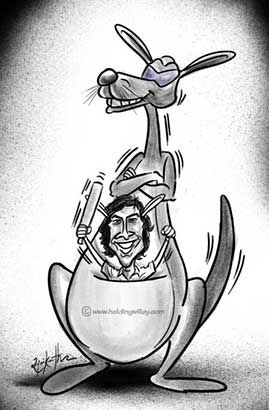 Battle has finally commenced, and if the first Test sets the tone for the rest of the series then we are in for one thriller of a summer. Low-scoring innings, a stunning debut that turned the game on its head, controversy, a ten-wicket haul for an on-form bowler, the result quite literally going down to the wire – Trent Bridge 2013 had it all.
Battle has finally commenced, and if the first Test sets the tone for the rest of the series then we are in for one thriller of a summer. Low-scoring innings, a stunning debut that turned the game on its head, controversy, a ten-wicket haul for an on-form bowler, the result quite literally going down to the wire – Trent Bridge 2013 had it all.
Ashton Agar’s innings, the highest Test score by a number 11 batsman, has drawn comparison with Tino Best’s effort against England last year – although the fact that Agar made his 98 against an Anderson-led England attack and clearly isn’t a tail-end slogger means that we’ll be hearing a lot more about him (for Australia’s second innings, he found himself promoted to number 8 and he may well be even higher in the order by the time this series is over).
Agar’s innings was a real game-changer, and gave England’s batsmen a heck of a job to do in their second innings which looked doomed when Root and Trott were removed by successive balls. But they rescued the situation, with Ian Bell of all people building on the foundations laid by Cook and KP in an impressive century partnership with Stuart Broad.
This leads us to the Test’s biggest flashpoint, Broad not walking after edging Agar to Clarke on Friday evening. Non-walkers tend to get people excited as they highlight the detachment of the professional game from the grass-roots level; in a Sunday afternoon club match, the unspoken rule is that if you know you’ve edged it, you walk – don’t bother waiting for the umpire to make his mind up. In a Test match, by contrast, you wait for the umpire’s decision – and if he didn’t see it (as Dar clearly didn’t), you take guard and carry on. Like it or not, that is how the modern professional game works.
In cricket, these things have a curious habit of working themselves out over the course of a match; earlier in that same innings, for example, Jonathan Trott had been given out lbw via a review even though the slow-motion replay appeared to show that the ball had made contact with his bat before hitting the pad.
That said, the key factor with the Broad edge wasn’t the fact that he didn’t walk – professionals don’t – but the fact that Michael Clarke had already used up his two review options and so was unable to refer this one to the third umpire. Alastair Cook drew some criticism during the match for tactical naiveté (muted criticism, thanks to the final outcome), but one aspect where he has proved more astute than Clarke has been in his use of reviews. Clarke himself admitted as much in his post-match interview.
This was obvious in the way the match ended just after lunch on Sunday, by which time the tension had racked up to levels unheard of since Edgbaston 2005. Having taken Australia to the brink of victory, Brad Haddin edged Anderson to Prior, wasn’t given out and therefore didn’t walk. Cook had a review option left, used it, and as a result England are 1-0 up.
Not that anyone has time to draw breath, though, for the second Test starts on Thursday…